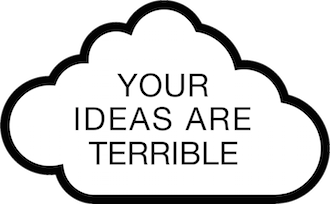I ran into Shane Reiser (@ShaneReiser) at the Intrapreneur Conference in Silicon Valley and was impressed by his new startup (Your Ideas are Terrible) with cofounder Carie Davis to bring lean thinking to corporate innovation. What follows is a Q&A we conducted over email with hyperlinks added for context.
Shane Reiser: Your Ideas Are Terrible
“Stop Ideating. Start Executing.
We are a corporate innovation consultancy focused on people, culture and process.
Because nobody needs more ideas without execution.”
Your Ideas Are Terrible homepage
Q: Can you talk a little bit about your background


Q: I understand that you have facilitated more than 100 Startup Weekends. What have you learned from that?
Shane: I learned how to handle chaotic situations with calmness – another skill that will help you in other areas of your life, namely relationships and parenthood. I also learned:
- Good people are everywhere and not all that different from each other.
- A good way to motivate people is to give them the space to tackle a problem they are already passionate about.
- Public speaking is scary but worth tackling – you’ll learn a lot about yourself and about others in the process and it will pay dividends in nearly all facets of your life.
- Ideas are worthless. Everyone has similar ideas across the world, it’s rare for someone to have a unique idea, and therefore, success must be more about execution and less about having a “good” idea.
- Bad ideas can turn into great ideas very easily with just a little bit of customer development work.
Your Ideas Are Terrible
Q: Can you each talk a little bit about what led you to found “Your Ideas Are Terrible.” What was the problem that motivated you?
 Shane: I thought the timing was right. I saw an opportunity to apply a methodology I knew very well to a different market. And I saw people grasping for a solution but not finding anything good enough. I also saw that most of the literature on corporate innovation was dry, and humorless. I thought I could build a successful business by offering a common sense, plain English approach to corporate innovation and differentiate by treating people like human beings rather than robots or academics.
Shane: I thought the timing was right. I saw an opportunity to apply a methodology I knew very well to a different market. And I saw people grasping for a solution but not finding anything good enough. I also saw that most of the literature on corporate innovation was dry, and humorless. I thought I could build a successful business by offering a common sense, plain English approach to corporate innovation and differentiate by treating people like human beings rather than robots or academics.
Q: How did you get started?
Shane: It all grew out of the work Carie was doing inside of Coca-Cola. Other companies heard about it and engaged with us to help them do the same at their companies. From there, we started to boil our curriculum and approach down to the fundamentals and design new products to solve problems we saw as unaddressed and recurring.
Q: Can you give me a brief overview of where the company is today?
Shane: About 2/3 of our business is focused on internal innovation. Our flagship products there are:
- 3-day event with a format not unlike Startup Weekend but with curriculum built in.
- Corporate hackathons done right (most aren’t).
- Small workshops to help innovation project teams get unstuck/
- Overall innovation strategy/process audits.
The other 1/3 of our work focuses on helping corporations and startups work together. We run a program called The Bridge Community, which was started by Coca-Cola but has expanded to include other corporations. We think the startup + corporation pilot/partnership opportunity is huge and ripe and so we’re thinking about focusing on that.
Q: What are the two or three things that you have been able to accomplish that you take the most pride in or satisfaction from?
Shane: Staying alive! Most consulting agencies can’t even get off the ground. We’ve been in business 3 years and have beaten my personal expectations for growth. I’m proud of how well Carie and I communicate and how happy our clients are. All of our work comes in through referrals.
Q: What has been the biggest surprise? What was one key assumption you made, perhaps even unconsciously, that has caused the most grief?
Shane: Our first approach to one-on-one team coaching did not work because we assumed people could and wanted to change the way they approached projects. Sometimes one or both of those weren’t true. We’ve since redesigned our process to acknowledge both of those realities. Sometimes half the battle is overcoming internal obstacles in the organization.
Q: What development, event, or new understanding since you started has had the most impact on your original plan? How has your plan changed in response?
Shane: The opportunity to run The Bridge Community with Coca-Cola opened our eyes to the benefits and difficulties of a corporate + startup partnership. Both sides have a lot to gain, one has more to lose, and both can and do fudge it up in so many ways.
Look for Disconfirming Evidence
Q: Any other remarks or suggestions for entrepreneurs?
Shane: You’ve heard it before from so many people, but take it from a guy who has seen thousands of pitches in hundreds of cities around the world: if you approach your company with the notion that your idea is terrible unless you fail to prove that it isn’t (that is, you can’t prove that your idea is bad), you’ll have more success. Don’t fall in love too soon. And if your product is in the market and you’re looking for large corporate customers, email me. I have advice and maybe a connection for you.
Q: What advice would you give intrapreneurs who are building internal teams to bring new solutions?
Shane: In my experience, the most common things overlooked by intrapreneurs are:
- the internal obstacles they will face (consider applying lean startup methods here, too),
- having a large rather than a small team,
- starting with a scope that’s too big,
- jumping to a solution too quickly when there ought to be several more weeks of customer interviews, and
- working on 10 projects at once, not allowing yourself the focus needed to see the patterns and find the meaningful insights.
For Further Reading on Your Ideas Are Terrible Website
- Innovation’s Seductive Reduction Don’t fall into the trap of believing that other domains where you firm has little experience are easier to address. Leverage key assets your firm has for innovation: access to beta customers, domain expertise, and proprietary data.
- Hackathon Quickstart Kit [Registration Link] The term hackathon covers a broad range of events that marry aspects of an unconference or Open Space model with a charette, a science lab, and a business accelerator for rapid prototyping by individuals or small groups. Corporate hackathons are open innovation events hosted by corporate sponsors that target a specific type of customer with a known problem. They offer a fresh perspective and new ideas, they can gather feedback on new API’s and speed their adoption, and offer a chance to explore partnerships with innovative startups. Here is five part series from their website
- Crowdsourcing Ideas for Corporate Innovation offers a number of practical tips including the need to respond quickly to submissions, to encourage ideas with supporting evidence that are big and small–don’t just aim for home runs.
Related Blog Posts
- Interview With Ben Yoskovitz on Highline BETA
- Jerry Weinberg Interview
- Managing Change in an Organization: An Incomplete Resource List
- SKMurphy Mentor for Startup Weekend Nov-2016 at Santa Clara Univ. Includes some suggestions for how to approach being a mentor at a Startup Weekend.
- Startup Fantasy Camp a comment on the limits of the Startup Weekend approach.
- The Fact That Your App Was a Weekend Project Is Not a Feature
- Interview with Rajeev Madhavan, CEO of Magma Design Automation a CEO perspective on corporate innovation.
A note on “Startup Genome”
There were two organizations that used the name “Startup Genome.” The first was started by Shane Reiser and David Lerner to help map local startup ecosystems, and was give a grant by the Kauffman Foundation in 2013 to create a network of local curators. The second started out as “Startup Compass” but started using the name “Startup Genome” before acquiring the first.

Thanks for the interview Sean!